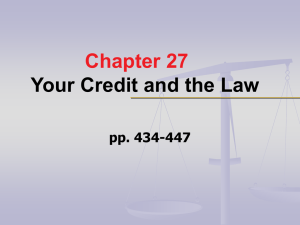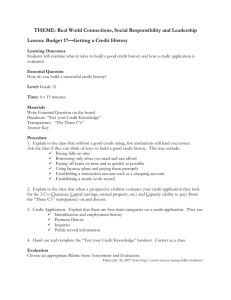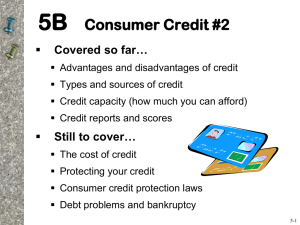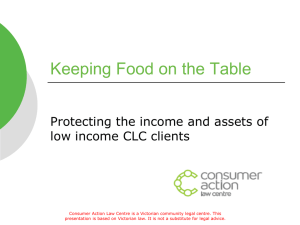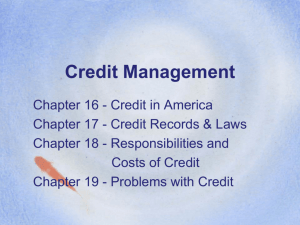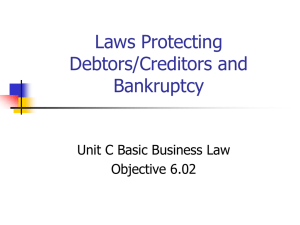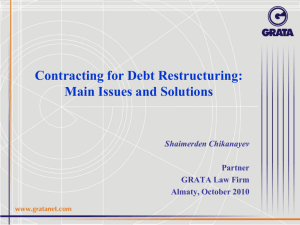Consumer Credit Rights & Laws: Presentation
advertisement
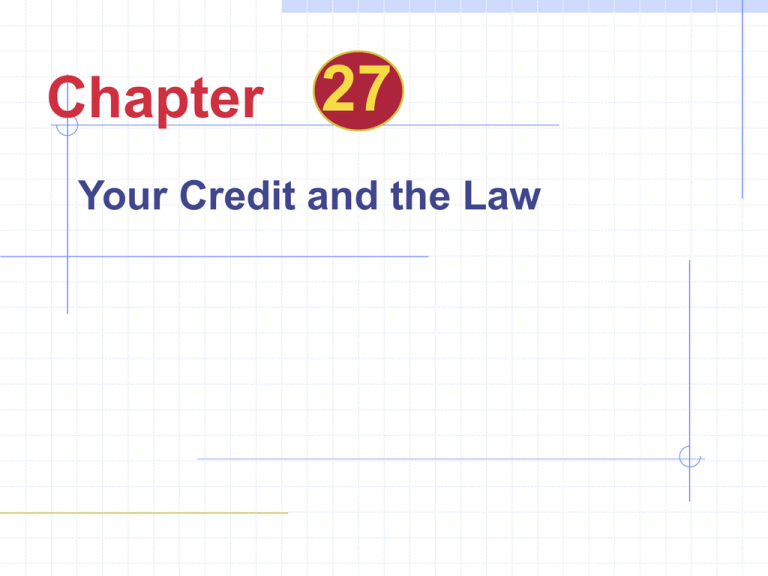
Chapter 27 Your Credit and the Law Protecting Your Credit Rights To protect consumers the federal and state governments regulate the credit industry. A law restricting the amount of interest that can be charged for credit is called a usury law. Introduction to Business 2 Enforcing the Laws The Federal Trade Commission (FTC) is responsible for enforcing the laws on credit. The FTC also helps consumers with credit problems such as Identity Theft. Introduction to Business 3 Consumer Credit Protection Act To make comparing credit costs easier, Congress passed the: • Consumer Credit Protection Act, also known as the Truth in Lending Law. Introduction to Business 4 Truth-in-Lending Disclosure All costs of borrowing must be made known to the consumer. These costs are provided in the truthin-lending disclosure that a creditor gives to a borrower. Introduction to Business 5 Truth-in-Lending Disclosure The two ways that the cost of credit must be expressed are: • The dollar cost of credit, or the total finance charge • The annual percentage rate (APR) The truth-in-lending disclosure also states the credit terms and conditions. Introduction to Business 6 Protecting Card Owners -The Truth-in-Lending Law states: If your credit card is lost or stolen and used by someone else, your payment for any unauthorized purchases is limited to $50. Introduction to Business 7 Equal Credit Opportunity Act The Equal Credit Opportunity Act says that a credit application can be judged only on the basis of financial responsibility. Introduction to Business 8 Equal Credit Opportunity Act The three reasons for denying credit are: • Low income • Large current debts • A poor record of making payments in the past Introduction to Business 9 Fair Credit Reporting Act When you apply for and use credit, the information goes into a file at one or more credit bureaus. A credit file includes personal, employment, and financial information. Introduction to Business 11 Right to Know The Fair Credit Reporting Act gives you the right to know what’s in your credit file. Once a year, you are entitled to a Free Credit Report If incorrect information is found, it must be removed from your file Introduction to Business 12 Protecting Card Owners FCRA - not allowed to send cards to consumers who didn’t request a credit card. Introduction to Business 14 Right to Privacy According to the FCRA, only authorized persons can see a copy of your credit report. • Apply for a job • Apply for credit • Apply for insurance Introduction to Business 15 Fair Credit Billing Act The Fair Credit Billing Act requires creditors to correct billing mistakes brought to their attention. The law also requires that consumers be informed of the steps they need to take to get an error corrected. Introduction to Business 16 Notify the Creditor The first step in correcting errors is to notify the creditor in writing. If the creditor made the mistake, you don’t have to pay any finance charge on the part in error. Introduction to Business 17 Stop Payment The Fair Credit Billing Act permits consumers to stop a credit card payment for items that are damaged or defective. Introduction to Business 18 Fair Debt Collection Practices Act A collection agent is a person or business that has the job of collecting overdue bills. Before this act, collection agents could use any method they chose to collect. Introduction to Business 19 Fair Debt Collection Practices Act The Fair Debt Collection Practices Act (FDCPA) regulates the practices of collection agents. Collection agents must identify themselves to the people whose bills they’re trying to collect. Introduction to Business 20 Fair Debt Collection Practices Act Collection agents can’t tell others about the debt. Collection agents can’t contact a person at work if the employer doesn’t permit it. Introduction to Business 21 Fair Debt Collection Practices Act •If they use the phone, collection agents can’t keep calling all the time or pretend to be someone else. (8 am to 9 pm only) •They can not harass or abuse, threaten violence or other criminal means to harm the physical person, reputation, or property of any person •They can not use of obscene or profane language Introduction to Business 22 What to do if you are denied credit? If you are not sure whether the reason for the denial is valid: Ask the creditor to explain why you were denied. Review your credit history. If you find your credit history contains errors, take steps to correct the errors. Introduction to Business 23 Fair Debt Collection Practices Act Collection agents can’t state the amount of a debt on a postcard that a neighbor or someone else might see. Introduction to Business 24 Graphic Organizer GraphicCredit Organizer Consumer Rights Consumer Credit Protection Act Right to know costs and terms of credit Equal Credit Opportunity Act Right to fair opportunity to obtain credit Fair Credit Reporting Act Right to know what’s in your credit file Fair Credit Billing Act Right to have billing mistakes resolved Fair Debt Collection Practices Act Right to be protected from collection agencies Introduction to Business 25 Repairing Credit Problems Who can help you? FIRST: Contact Creditors and explain your situation Adjust Payments Introduction to Business 29 Credit Counseling A credit counselor can help you revise your budget, contact creditors to arrange new payment plans, or help you find other sources of income. Introduction to Business 30 Consolidating Debts A consolidation loan combines all your debts into one loan with lower payments. Introduction to Business 31 Consolidating Debts The two problems with a consolidation loan are: • There is usually a high interest rate because people who get such loans are considered poor credit risks. • Because there is only one monthly payment, you might feel that the credit problem is under control and start charging new purchases. Introduction to Business 32 Bankruptcy Bankruptcy is a legal process in which you are relieved of your debts, but your creditors can take some or all of your assets. When bankruptcy is declared, the debtor, the creditor, and a court-appointed trustee come up with a plan to repay the debt on an installment basis. Introduction to Business 33 Bankruptcy You should avoid bankruptcy because it gives you a bad credit record. Recent changes in the law have made it harder to declare bankruptcy. Introduction to Business 34 What to do if you are denied credit? If you think the reasons for the denial are valid: Ask the creditor if you can provide additional information Arrange alternate credit terms. Apply to another creditor whose standards may be different. Contact the CRA to see if there are problems with your Credit Report Introduction to Business 35
